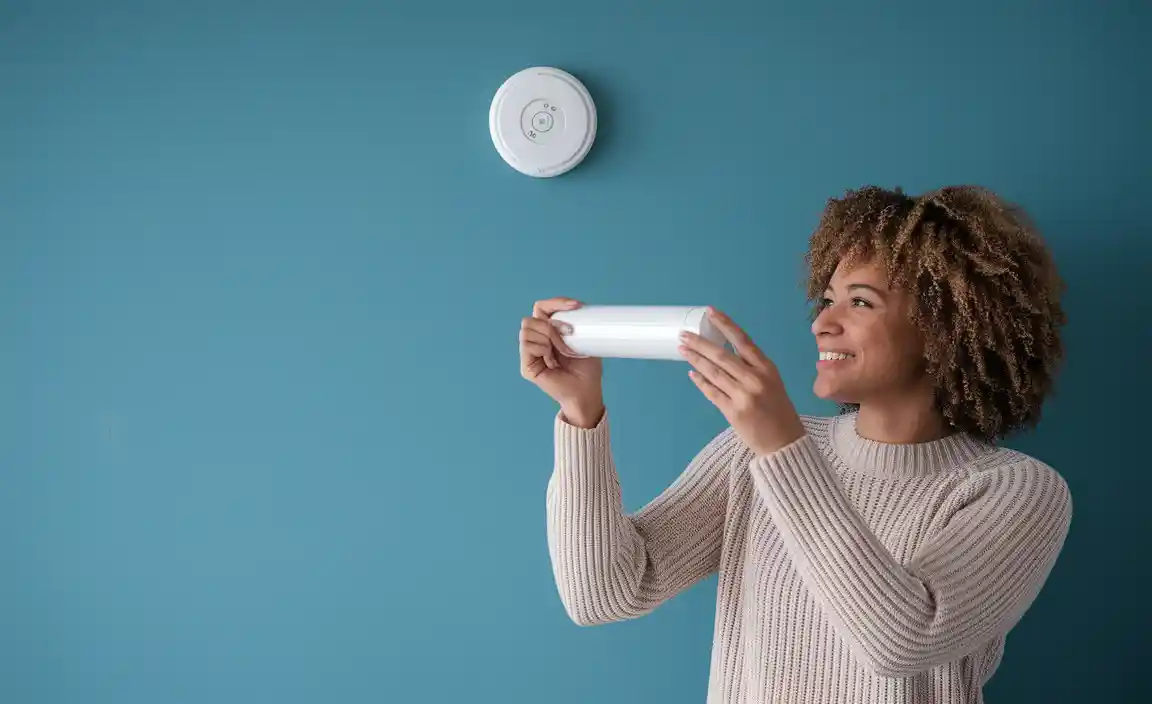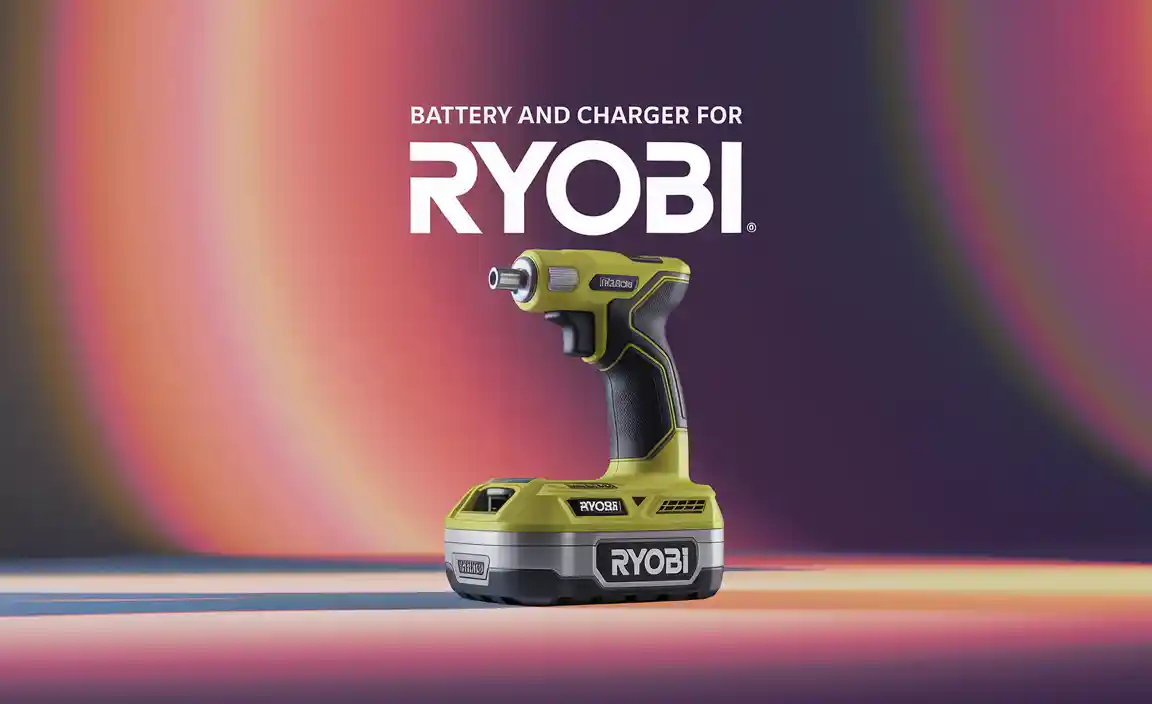Have you ever wondered what batteries your smoke detector needs? This small device plays a big role in keeping your home safe. Many people don’t think about it until there’s a problem. Imagine waking up at night to a loud beep. That sound could mean your smoke detector needs new batteries.
It’s surprising to learn that different smoke detectors use different types of batteries. Did you know that some detectors can even use batteries that last for years? This makes it easy to keep your home safe without frequent changes. But which batteries should you choose for your smoke detector? Making the right choice can help ensure your safety.

In this article, we will explore the best batteries for smoke detectors. You’ll find tips on how to select the right type and length of battery. By the end, you’ll feel confident in keeping your smoke detector ready to protect your home.
What Batteries For Smoke Detector: Essential Guide To Power Choices
When it comes to smoke detectors, choosing the right battery is key. Most detectors use 9V batteries, but some models may require AA batteries. It’s essential to check your smoke detector’s manual to find out which type you need. Did you know that using the wrong battery can prevent your smoke alarm from working? Regularly replacing batteries can save lives, so keep a spare on hand! Ensure your safety at home with the right batteries for your smoke detector.
Types of Batteries Used in Smoke Detectors
Alkaline Batteries: Common choice with varying lifespans. Lithium Batteries: Longlasting option; benefits and downsides.
Batteries are the lifeline of your smoke detector, keeping you safe while you sleep. There are two main types to consider: alkaline and lithium. Alkaline batteries are a common choice. They last about six months to a year, depending on the brand and usage. On the flip side, lithium batteries can last up to ten years. They may be pricier, but you won’t have to worry about changing them often—like a cat that always comes back for dinner! Here’s a quick look at both options:
| Type | Average Lifespan | Pros | Cons |
|---|---|---|---|
| Alkaline | 6 months – 1 year | Cheap, easy to find | Frequent replacement needed |
| Lithium | Up to 10 years | Long-lasting, reliable | Higher upfront cost |
Choosing the right battery means more than just picking a random pack. Remember, your safety is worth it!

Battery Sizes Compatible with Smoke Detectors
9V Batteries: Most commonly used size in residential smoke detectors. AA and AAA Batteries: Alternative options and specific detector models.
When it comes to smoke detectors, knowing which batteries to buy is key. Most residential smoke detectors use the 9V battery. It’s like the superstar of smoke detector batteries! Some models, though, might surprise you. They can run on AA or AAA batteries. Always check your smoke detector’s manual for the best fit. It’s a battery party—just make sure you bring the right guests!
| Battery Type | Compatibility |
|---|---|
| 9V | Most common for residential smoke detectors |
| AA | Some specific detector models |
| AAA | Used in certain detectors |
Understanding Battery Lifespan and Maintenance
Lifespan of Different Battery Types: How long can each type last?. Maintenance Tips: Ensuring optimum functionality of smoke detector batteries.
Not all batteries are created equal! Some last longer than others, like a tortoise beating a hare, but with less drama. Here’s how different types stack up:
| Battery Type | Average Lifespan |
|---|---|
| Alkaline | 2-5 years |
| Li-ion | 5-10 years |
| Nickel Cadmium (NiCd) | 3-5 years |
To keep your smoke detector battery happy, try these tips:
- Check and replace batteries at least once a year.
- Dust off detectors regularly; they don’t like surprises!
- Test it monthly—think of it as a little battery workout!
Following these steps can help you sleep soundly and safely, knowing your home is protected.
Signs Your Smoke Detector Battery Needs Replacement
Chirping Sounds: What they indicate and when to act. Blinking Lights: Meaning behind flashing indicators on smoke detectors.
Have you heard chirping sounds from your smoke detector? This noise means it’s time to change the battery. Don’t ignore it! Each chirp warns you that the battery is low. Pay attention to blinking lights, too. If the light flashes, it often means the device is working but the battery may need replacing soon.
- Chirping Sounds: Replace battery immediately.
- Blinking Lights: Check battery status.
Keeping your smoke detector in top shape can save lives. Remember, a working smoke detector could make all the difference during an emergency!

How often should I replace my smoke detector battery?
You should replace your smoke detector battery at least once a year. This helps ensure your home stays safe from fires.
Best Practices for Battery Replacement
Recommended Replacement Frequency: How often should batteries be changed?. Safe Removal and Installation: Steps to ensure proper handling.
Changing smoke detector batteries is a bit like brushing your teeth: You should do it regularly! Experts suggest changing batteries every 6 months. Set a reminder during daylight saving time—it’s easy to remember! When you replace batteries, ensure safety by turning off the device. Use a screwdriver to gently remove the battery cover. Handle batteries carefully; they don’t like being dropped or tossed, and neither do we! After swapping batteries, double-check to make sure it’s back in place and working. Remember, a happy smoke detector means a happy home!
| Task | Frequency |
|---|---|
| Battery Replacement | Every 6 months |
Environmental Considerations for Battery Disposal
Recycling Programs: Options for disposing of used batteries. Environmental Impact: Why proper disposal is important.
Used batteries should not go in the trash. They can harm our environment. Instead, look for recycling programs in your area. Many places collect old batteries for safe disposal. This helps protect nature and is good for everyone. When batteries leak, they can pollute soil and water. Properly recycling them reduces waste and keeps our planet clean.

Why is proper disposal important for batteries?
Improper disposal of batteries can lead to dangerous leaks and toxins. It’s good to know that recycling batteries can prevent these harmful effects. Choosing to recycle is a simple act that makes a big difference.
Frequently Asked Questions About Smoke Detector Batteries
Common Misconceptions: Addressing myths surrounding smoke detector batteries. Troubleshooting Issues: Solutions to frequent batteryrelated problems.
Many people have questions about smoke detector batteries. Let’s clear up some common myths. One myth is that all smoke detectors use the same battery. Actually, different models need different batteries. Another issue is battery life. Some think batteries last forever, but they only last a few years.
When facing problems, there are some easy fixes:
- If your smoke detector beeps, replace the battery.
- Check connections if it won’t turn on.
- Dust buildup can affect performance—clean it regularly.
Understanding these tips helps keep your home safe!
Conclusion
In conclusion, smoke detectors often use 9-volt or AA batteries. It’s important to check your smoke detector’s manual for the right type. You should change the batteries at least once a year. Remember to test your smoke detector monthly. For more tips on fire safety, you can read more articles or visit safety websites. Stay safe!
FAQs
What Type Of Batteries Are Commonly Used In Smoke Detectors?
Smoke detectors usually use 9-volt batteries or AA batteries. The 9-volt battery looks like a small rectangle. AA batteries are more round and can come in a package. You should check and change the batteries once a year to keep your smoke detector working well.
How Often Should The Batteries In A Smoke Detector Be Replaced?
You should replace the batteries in a smoke detector once a year. It’s a good idea to do this when you change your clocks for daylight saving time. If your smoke detector starts beeping, it means the battery might be low, and you should change it right away. Always make sure your smoke detector works by testing it monthly. This helps keep you and your family safe!
Can Rechargeable Batteries Be Used In Smoke Detectors?
No, you shouldn’t use rechargeable batteries in smoke detectors. They often don’t work well with smoke alarms. Smoke detectors need batteries that provide a steady power for safety. It is best to use regular, non-rechargeable batteries. Always check the label to be sure!
What Are The Signs That The Smoke Detector Batteries Need To Be Replaced?
You know it’s time to change the smoke detector batteries when you hear a chirping sound. This sound happens usually every few minutes. You might also notice that the detector is flashing a red light. Lastly, if the smoke detector doesn’t respond when you press the test button, it needs new batteries. Always check them to keep your home safe!
Are There Any Smoke Detectors That Come With Built-In Batteries That Last For Several Years?
Yes, there are smoke detectors with built-in batteries that can last up to 10 years. These batteries are not meant to be changed, so you don’t have to worry about replacing them. When the smoke detector gets old, you just replace the whole unit. This makes it easy and safe to keep your home protected!
Resource:
-
U.S. Fire Administration – Smoke Alarm Basics
smoke alarm safety tips from the U.S. Fire Administration -
EPA – Battery Recycling Guidelines
how to dispose of used batteries safely -
National Fire Protection Association (NFPA) – Smoke Alarms
NFPA guidelines for smoke alarm maintenance -
Consumer Reports – Smoke Detector Buying Guide
a guide to choosing the right smoke detector features






